Dive into the spiritual journey of a lifetime as we guide you on how to traverse the Bible in just 15 days; are you ready?

How to Read the Bible in 15 Days
So, you've decided to conquer the Bible in a fortnight, just like you mastered baking sourdough during quarantine, right? Well, it's no small feat, but it's certainly achievable with a plan and some dedication.
Let's break this down, shall we? Imagine immersing yourself in the rich narratives of Genesis, engaging with the poetic wisdom of Psalms, or unraveling the prophetic mysteries of Revelation – all in just over two weeks. Intriguing, isn't it?
However, there's more to this journey than mere fascination. What could that be, you wonder?
Key Takeaways
- Allocate a specific amount of time each day to read and understand the diverse themes and lessons in the Old Testament.
- Focus on wisdom literature to gain insights into righteous living, divine wisdom, and philosophical insights.
- Incorporate prophetic books into your study to understand divine judgement, restoration, and the emphasis on righteousness.
- Transition to the New Testament to grasp the teachings of Jesus Christ, the struggles of the early Christian church, and the manifestation of God's love.
Day 1: Genesis to Exodus
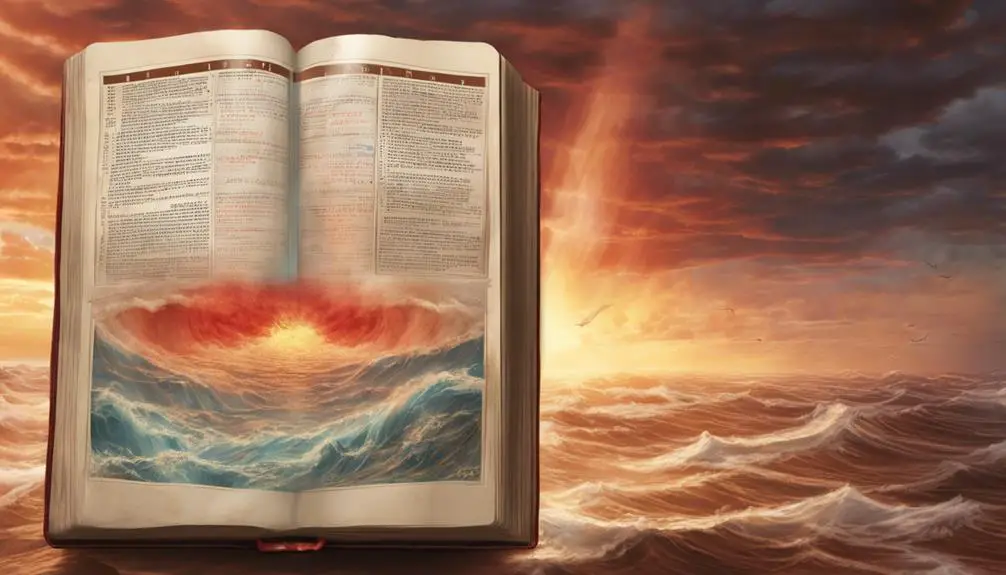
On your first day, dive into the rich narratives of Genesis and Exodus, where you'll encounter profound themes of creation, humanity, and liberation. Genesis offers two distinct creation stories, each providing unique insights into the divine and human nature. A comparative reading will reveal a God who creates through command in Genesis 1, and a more hands-on, artisan God in Genesis 2. This creation stories comparison illuminates a multi-faceted image of God, influencing subsequent theological understandings.
Exodus, on the other hand, is a saga of liberation. It's not merely historical recounting, but a profound exploration of human suffering, divine intervention, and the transformative power of faith. Through your Exodus interpretation, discern the character of Moses, the reluctant leader, and the Israelites' journey from oppression to freedom. This text also introduces the critical concept of covenant, marking a significant evolution in the relationship between God and humanity.
As you grapple with these narratives, you'll appreciate the complexity of Biblical texts, their enduring relevance, and the layers of meaning beneath the surface. Remember, the Bible isn't just a book to be read, but a text to be engaged with, questioned, and understood.
Day 2: Leviticus to Numbers

Delving into Leviticus and Numbers on the second day, you'll find yourself immersed in complex laws and wilderness wanderings that further shape the Israelites' identity as God's chosen people. Leviticus' significance lies in its instructions about holiness, rituals, and ethical standards. In contrast, Numbers interpretation reveals a narrative of the Israelites' journey, filled with divine guidance, rebellion, and hope.
Consider the table below to understand key themes:
Book |
Key Themes |
Notable Sections |
|---|---|---|
Leviticus |
Holiness, Rituals, Ethics |
Leviticus 11 (Dietary Laws), Leviticus 16 (Day of Atonement) |
Numbers |
Journey, Rebellion, Hope |
Numbers 13-14 (Spies into Canaan), Numbers 21 (Bronze Serpent) |
Leviticus, through its emphasis on ethical living and divine rituals, teaches us about the holiness of God and the moral conduct He expects. It's a reminder that faith isn't just spiritual but also practical and ethical.
Numbers, on the other hand, with its collection of stories, laws, and census data, teaches us about the consequences of disobedience and the grace of God amidst rebellion. It's a testament to the long-suffering nature of God, who guides and provides despite the people's recurrent rebellion.
Day 3: Deuteronomy to Joshua

Transitioning into Deuteronomy and Joshua on the third day, you'll encounter the final teachings of Moses and the Israelites' triumphant entrance into the Promised Land. Here, Deuteronomy's significance lies in its role as a covenant renewal document, underscoring the spiritual and moral obligations the Israelites owe to God. It's within these pages that Moses delivers his final sermons, a last effort to impress upon his people the importance of obedience and faithfulness.
Following this, the book of Joshua showcases a stark contrast, shifting from teachings to action. Joshua's leadership is instrumental in this phase. He's a military leader, a diplomat, but most significantly, a faithful servant of God. His unwavering confidence in God's promises propels the Israelites' campaign in Canaan. The battles fought, cities conquered, and the division of land among the tribes, all under Joshua's guidance, symbolize the fulfillment of God's promise to Abraham.
In essence, Day 3's reading encapsulates the transition from Moses' law-centered teachings to Joshua's enactment of God's promises. It provides a rich blend of theology, history, and moral lessons, signifying a pivotal point in the Israelites' journey.
Day 4: Judges to 1 Samuel
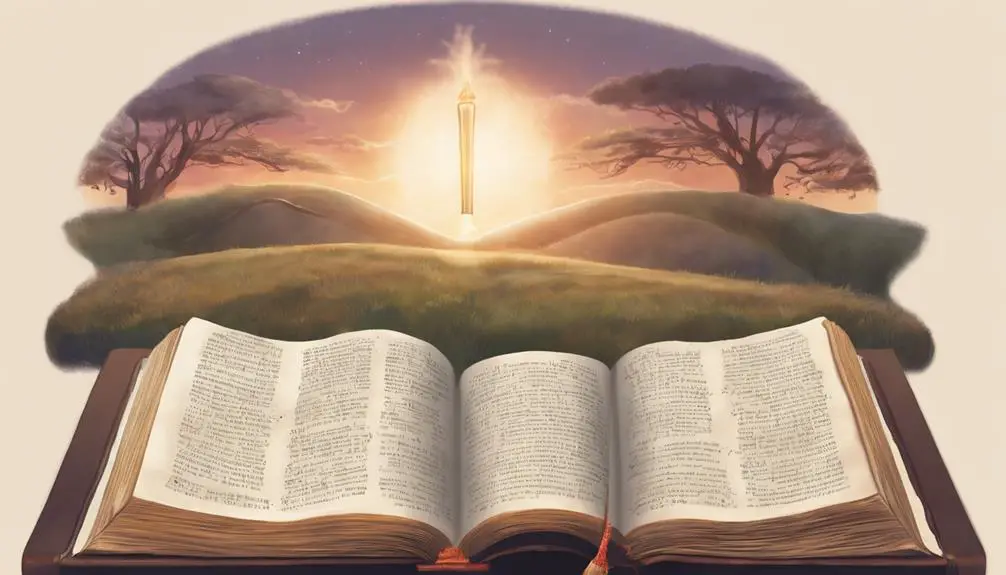
As you continue into the fourth day with the books of Judges and 1 Samuel, you'll encounter a shift in the narrative, exploring a time in Israelite history marked by leadership under judges and the establishment of monarchy. These books provide a rich tapestry of the nation's evolution, characterized by the Judges' impact and Samuel's leadership.
- Judges' Impact: Judges, as temporary military leaders, played pivotal roles in guiding Israel through periods of crisis. Their stories reveal the cyclical nature of Israel's sin, punishment, repentance, and deliverance, providing profound insights into human nature and divine mercy.
- Samuel's Leadership: Samuel, the last judge and the first prophet, occupies a unique position in Israel's history. His leadership marks the transition from theocracy to monarchy, chosen by God to anoint the first and second kings of Israel.
- Establishment of Monarchy: The request for a king in 1 Samuel 8 signifies a significant shift in Israel's governance. Despite the divine warning about the potential abuse of kingly powers, the monarchy is established, setting a new course for the nation's future.
As you delve into these narratives, you'll uncover the complexities of Israel's historical and spiritual journey.
Day 5: 2 Samuel to 1 Kings
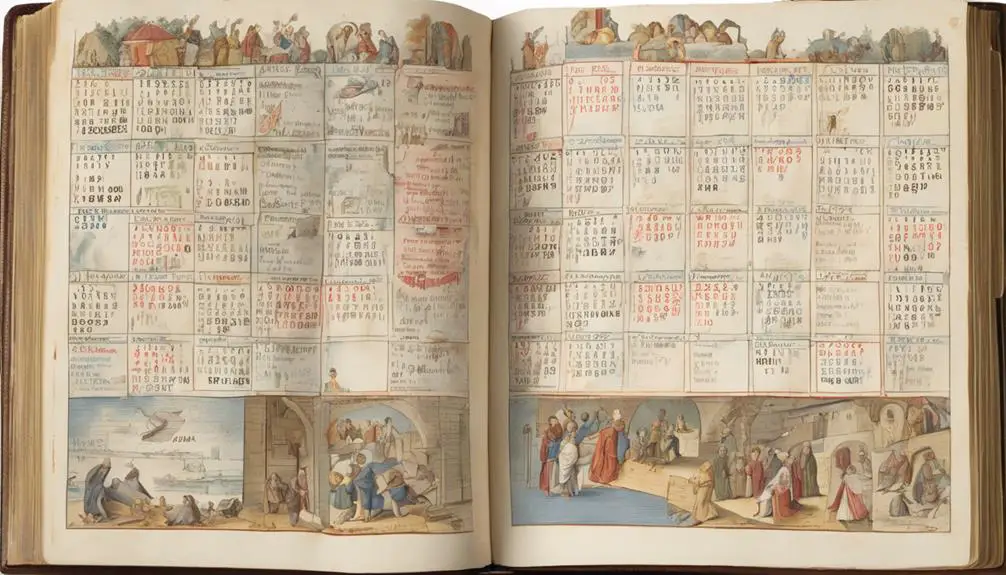
On the fifth day, you'll plunge into the compelling narratives of 2 Samuel and 1 Kings, witnessing the consequential reigns of King David and King Solomon, alongside the subsequent division of the Israelite kingdom. These books not only highlight the kings' successes and failures but also provide a profound insight into Samuel's leadership – his dedication, integrity, and prophetic prowess.
To better understand, consider this table:
Book |
Key Character |
Significant Event |
|---|---|---|
2 Samuel |
King David |
David's Reign |
1 Kings |
King Solomon |
Solomon's Reign and Kingdom Division |
The interpretation of 1 Kings is complex, considering the numerous political, religious, and ethical issues presented. It's a tale of the rise and fall of Solomon, his wisdom, the construction of the Temple, and the subsequent division of the kingdom after his death.
Day 6: 2 Kings to 2 Chronicles
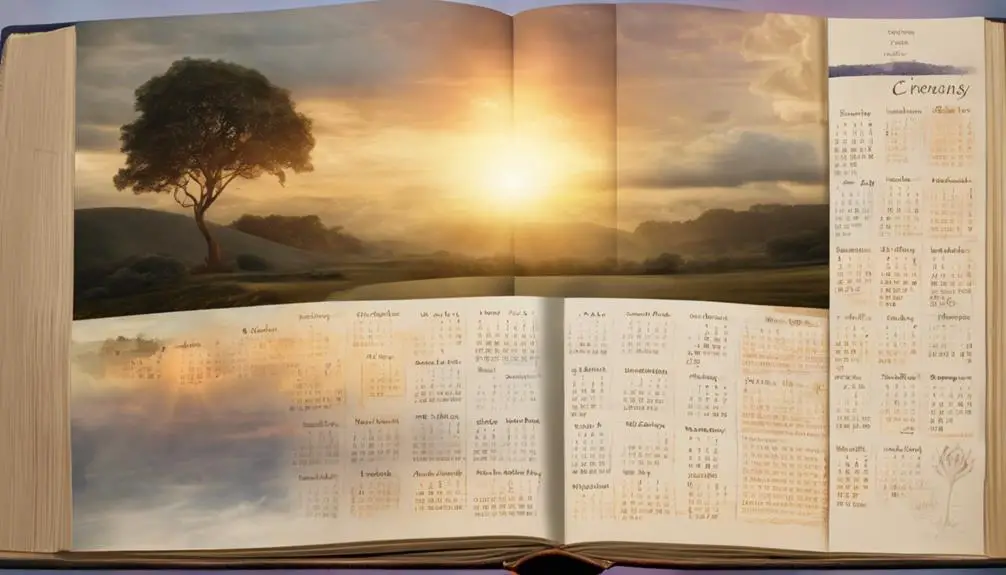
Delving into the sixth day, you'll explore the gripping chronicles of 2 Kings and 2 Chronicles, tracing the tumultuous history of the divided kingdoms of Israel and Judah, their respective rulers, and the eventual exile of both nations. You'll witness the struggle between faith and disobedience, and the profound repercussions of each choice.
Consider these three points as you read:
- Exploring religious themes in 2 Kings: Note how the book underscores the consequences of idolatry and disobedience, contrasted against the rewards of faithfulness.
- Analyzing the historical context of 2 Chronicles: Pay attention to the meticulous details of the temple, the reigns of the kings, and the prophets' messages. These provide a crucial understanding of the social and religious climate of the time.
- Examine the overarching narrative: Both books, despite their historical accounts, intertwine religious instruction with societal commentary, offering timeless lessons.
In essence, your exploration of 2 Kings and 2 Chronicles won't only enrich your understanding of biblical history but also elucidate religious themes integral to the Judeo-Christian tradition. It's a captivating journey filled with intriguing narratives and profound insights. So, brace yourself for an enlightening experience.
Day 7: Ezra to Job
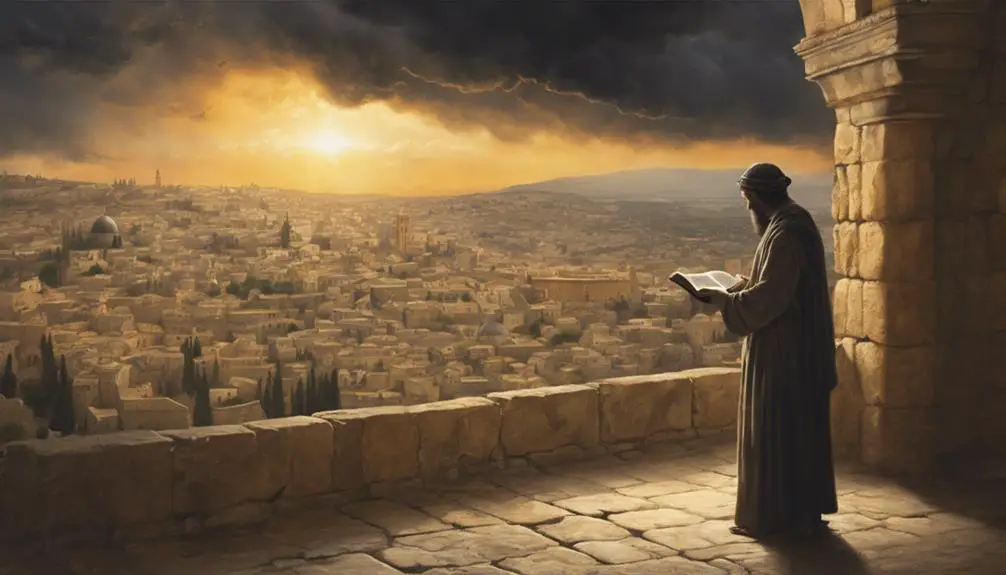
Embarking on the seventh day, you'll dive into the books of Ezra and Job, encountering the poignant narratives of rebuilding and enduring profound suffering respectively. Ezra's leadership style is worth studying in detail. As a scribe and a priest, he led the second wave of Jews returning from Babylonian exile. His stewardship is characterized by dedication, humility, and an unflinching adherence to the Law. Ezra's vision of restoration was fulfilled through a relentless commitment to purify the community and reinstate observance of the Torah. His leadership offers valuable lessons on spiritual integrity and resilience.
Moving forward, the book of Job presents a profound exploration of suffering and perseverance. Job's perseverance lessons are an enduring testament to faith in the face of incomprehensible pain. Job's unwavering fidelity to God, even as his life crumbles around him, illuminates the strength of character and depth of faith required to persevere. His steadfastness underscores the importance of maintaining faith during times of adversity.
The journey through Ezra and Job offers a dual lens through which you can view the themes of leadership and perseverance in the face of adversity, providing rich insights for personal growth and spiritual maturity.
Day 8: Psalms to Proverbs

Transitioning into the eighth day of your biblical journey, you'll immerse yourself in the wisdom and honest emotional expressions found within the books of Psalms and Proverbs.
The book of Psalms, a collection of 150 hymns and prayers, exudes a unique emotional authenticity that spans from sorrow to joy. The cultural impact of Psalms can't be overstated. Its influence permeates through literature, music, and the arts, offering solace and inspiration to millions.
Next, you'll dive into Proverbs, a compilation of wise sayings and principles for living a righteous and fulfilling life. The wisdom in Proverbs provides practical guidelines for personal conduct, family matters, and moral decisions.
Here are three key takeaways you should anticipate:
- Psalms offers an honest, raw expression of emotions, serving as a reminder that it's okay to express your feelings to God, whether they're positive or negative.
- The 'Psalms' impact on culture' is profound, as seen in its influence in music, literature, and everyday language.
- 'Wisdom in Proverbs' provides actionable guidance for moral living, encouraging readers to seek wisdom above all else.
Day 9: Ecclesiastes to Song of Solomon

As you continue on to the ninth day of your journey, you'll explore the philosophical musings of Ecclesiastes, before immersing in the poetic, passionate verses of the Song of Solomon. The Ecclesiastes interpretation hinges on its exploration of the meaning of life and the best way to live it, a reflection of Solomon's wisdom.
You'll find that Ecclesiastes speaks to the futility of worldly pursuits, emphasizing that all is 'vanity'. It's not a call towards nihilism but an invitation to seek out the divine, to find joy and purpose beyond the mundane.
Book |
Key Message |
|---|---|
Ecclesiastes |
All is vanity without God |
Song of Solomon |
Divine love is most fulfilling |
Next, you'll dive into the Song of Solomon, a unique book that stands out for its lyrical beauty. It's an allegory of the love between God and His people, depicted through the passionate love story of Solomon and his beloved. The interpretation of this book requires an understanding of its metaphorical language and the cultural context of its time.
Keep these insights in mind as you continue your journey through these insightful books.
Day 10: Isaiah to Jeremiah

Delving into the tenth day of your biblical journey, you'll navigate the prophetic landscapes of Isaiah and Jeremiah, rich with divine visions, warnings, and promises. Isaiah's prophetic messages, often mirrored in Jeremiah's writings, delve into a depth of spiritual significance that warrants your thoughtful exploration.
- First, you'll encounter Isaiah, whose writings are often categorized into three key themes: judgment, comfort, and future glory. His prophetic messages, filled with metaphorical language and vivid imagery, serve as both a stern warning and a beacon of hope for the people of Judah and Jerusalem.
- Next up is Jeremiah, a prophet notoriously known for his sorrow, hence the term 'Jeremiah's lamentations'. His lamentations' significance lies in their raw expression of grief and despair, a poignant reflection of the human struggle amid divine judgment.
- Lastly, you'll notice the resonance between Isaiah and Jeremiah's messages. Both prophets convey not only a divine warning but also a promise – a promise of future redemption and restoration.
Day 11: Lamentations to Ezekiel
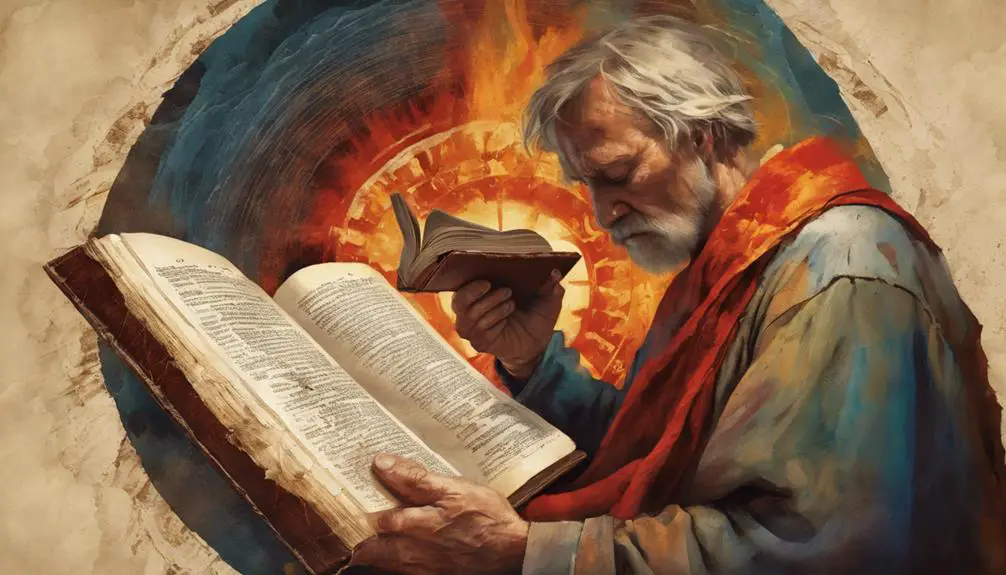
Plunging into the eleventh day of your biblical voyage, you'll traverse from the mournful lamentations of Jeremiah to the visionary prophecies of Ezekiel, experiencing a shift in tone and perspective that sheds new light on the divine narrative.
Lamentations' relevance lies in its exploration of grief, a universal human experience. The poetic verses encapsulate a poignant tale of Jerusalem's destruction, offering readers a unique perspective on the cycles of suffering and redemption that underpin the biblical narrative.
Progressing to Ezekiel, you'll find a dramatic shift. Ezekiel's prophecies are marked by vivid, symbolic imagery and a heightened sense of divine intervention. His visions, including the famous 'valley of dry bones', symbolize both the spiritual death and subsequent resurrection of Israel. They serve as a reminder of God's capacity to breathe life into seemingly hopeless situations, reinforcing the theme of redemption.
Day 12: Daniel to Hosea
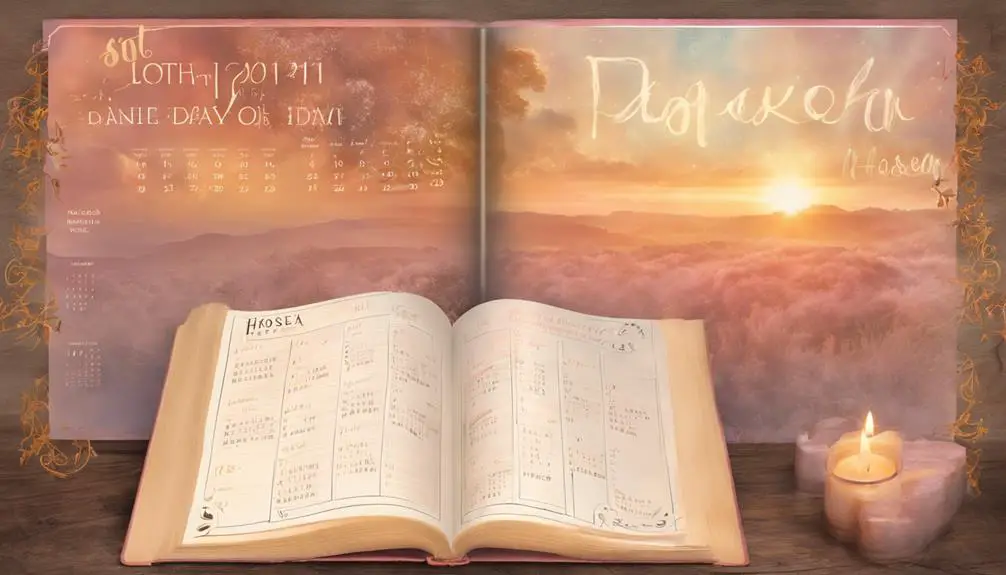
Embarking on the twelfth day of your journey through the Bible, you'll transition from the prophetic visions of Daniel to the poignant messages of Hosea, encountering a rich tapestry of dreams, symbols, and Divine revelations that further deepen your understanding of the biblical narrative.
In Daniel, you'll delve into complex prophecies. Your focus should be on Daniel's Prophecies Interpretation. This book is renowned for its precise prophetic accuracy, predicting empires' rise and fall with uncanny precision.
Hosea, on the other hand, employs a myriad of metaphors to communicate God's love and judgment. These Metaphorical Messages of Hosea mirror the covenant relationship between God and His people, likening it to a tumultuous marriage marked by infidelity yet sustained by unending love.
To guide your study, consider these key points:
- The interpretation of Daniel's prophecies: Look for the historical fulfillment of these predictions and their relevance today.
- Hosea's metaphorical messages: Examine the symbolism used in the narrative to understand God's character and His relationship with His people.
- The transition between the two books: Note how Daniel's visions of future events contrast with Hosea's retrospective look at Israel's spiritual infidelity.
Your exploration of these books will provide invaluable insights into God's sovereignty and relentless love.
Day 13: Joel to Amos

On the thirteenth day of your biblical exploration, you'll transition from Joel's vivid apocalyptic visions to Amos's powerful social critiques, gaining a deeper understanding of God's divine justice and mercy. The prophetic messages in Joel present a narrative of devastation and restoration, underscoring God's sovereignty in both judgement and salvation. The book's apocalyptic nuances serve to underline the severity of God's judgement and the resulting need for genuine repentance.
Moving on to Amos, you'll encounter a strong emphasis on social justice. Amos, a shepherd and a fig-tree grower, brings to light the societal inequities of his time. The book's central theme revolves around the Israelites' moral failure, their neglect for the poor, and the impending divine judgement. Amos's message is a potent reminder of God's intolerance towards injustice and His demand for righteousness.
As you delve into these texts, you'll perceive the blend of divine judgement and mercy, a recurrent theme in prophetic literature. These books illustrate God's unwavering commitment to justice, His deep desire for human repentance, and His readiness to extend mercy. They underscore the complexity of God's character and His profound concern for humanity's moral compass.
Day 14: Obadiah to Zephaniah

As you continue your journey on the fourteenth day, you'll delve into the insights of Obadiah and Zephaniah, exploring themes of divine judgement, restoration, and God's protective love. These minor prophets, though brief in their accounts, pack a powerful punch with their messages.
- Obadiah's prophecy significance: This book, the shortest in the Old Testament, is centered around Edom's downfall. Obadiah, as God's messenger, warns them of their impending doom due to their pride and harm inflicted on their brother nation, Israel. You'll learn how God's justice transcends familial and national boundaries, affirming that no transgression escapes His notice.
- Edom's destruction and Israel's restoration: Obadiah doesn't end with judgement. It culminates in a hopeful note of Israel's restoration, a recurring theme in prophetic literature. This is a reminder of God's enduring love for His covenant people.
- Zephaniah's message relevance: Zephaniah, a fourth-generation descendent of King Hezekiah, also prophesies divine judgement, but on a global scale. His message is relevant today as it underscores the universal accountability to God and the ultimate triumph of righteousness.
Today's reading will challenge you to reflect on God's justice, mercy, and our responsibility in a world under His sovereign rule.
Day 15: Haggai to Revelation
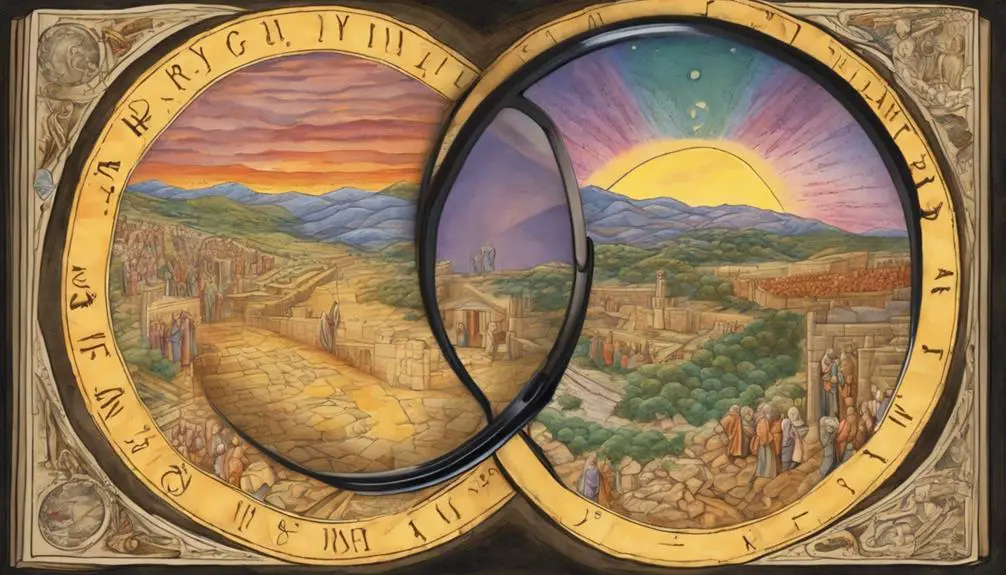
Wrapping up your two-week spiritual journey, you now move into the fifteenth day with Haggai and proceed all the way to the Revelation of John, traversing a broad spectrum of biblical literature that encapsulates the culmination of God's grand narrative. Haggai's teachings, though concise, are poignant reminders of the importance of prioritizing God's work above personal interests. His prophetic revelations provided critical direction during the rebuilding of the Second Temple, emphasizing God's sovereignty and commitment to His people.
Next, you'll delve into the New Testament, starting with the Gospels and continuing through the Epistles. Here, you'll encounter the life, teachings, death, and resurrection of Jesus Christ, as well as the early Christian church's struggles and triumphs. You'll discover the love, grace, and truth of God manifested in Christ, and the transformative power of faith in Him.
Frequently Asked Questions
What Are Some Strategies to Understand the Complex Language Used in the Bible?
To understand the Bible's complex language, you'll need to delve into biblical symbolism and ancient context. Studying symbolism helps you grasp the deeper meanings often hidden in biblical texts.
Understanding the ancient context gives you insight into the cultural, historical, and social backdrop of the scriptures. It's not an easy task, but with diligent study and perhaps guidance from a knowledgeable source, you'll start unlocking the Bible's rich layers of meaning.
How Can I Keep Track of the Different Characters and Their Stories Throughout the Bible?
To keep track of the numerous characters and their stories in the Bible, you'd find character mapping and story sequencing quite helpful.
Character mapping helps you understand each character's role and relationships, while story sequencing allows you to follow their journeys chronologically.
It's a bit like piecing together a puzzle, but it's an effective way to grasp the complex narratives and themes within this significant text.
Are There Any Recommended Supplementary Resources to Aid in Understanding the Bible?
Sure, there are numerous resources to assist you in understanding the Bible.
For instance, a Biblical Translations Comparison can help you grasp the variations between different versions.
Additionally, delving into Ancient Context Understanding can provide insight into the historical and cultural backdrop of the scriptures.
Don't be afraid to use these tools to enhance your comprehension and appreciation of the biblical text.
How Can I Apply the Teachings and Lessons From the Bible to My Daily Life?
You can apply Biblical wisdom to your daily life by practicing practical spirituality. This involves reflecting on the teachings, drawing parallels to your life situations, and making conscious decisions based on these insights.
It's not just about understanding the words, but living them. Prayer, meditation, and acts of kindness can serve as practical applications. Remember, it's a personal journey of faith and understanding.
You'll find your life enriched and your actions aligned with these age-old wisdom.
How Should I Deal With Contradictory Interpretations of the Bible's Passages?
When dealing with interpretation challenges and resolving contradictions in the Bible's passages, you shouldn't fret. Remember, it's normal to encounter such issues in any text.
Start by seeking scholarly guidance, compare different translations, and consider the historical context. Don't be quick to form conclusions. Allow room for evolving understanding.
It's a complex task, but with patience, you'll gain deeper insights and hopefully achieve a more comprehensive interpretation.
Conclusion
Having traversed the vast biblical landscape from Genesis to Revelation in 15 days, you've engaged in a profound exploration of faith, history, and spirituality.
Remember, this journey isn't just about reading; it requires deep contemplation and analysis. It's not a race, but a process of discovery and understanding.
Revisit and delve deeper into the scriptures, allowing them to enrich and guide your life. This is only the beginning of your lifelong biblical exploration.



Sign up